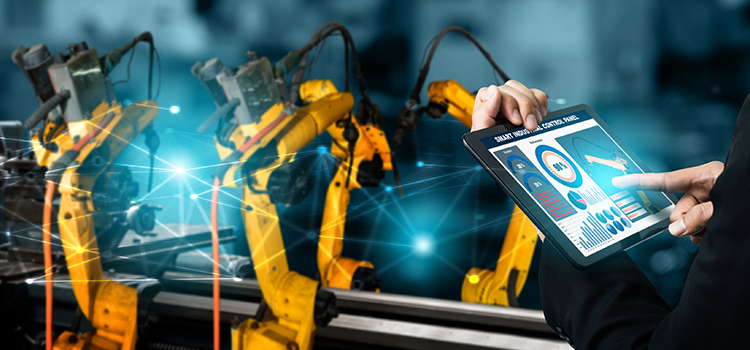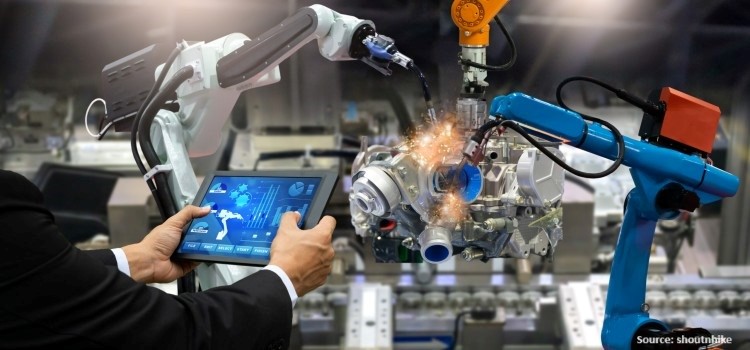Emerging Technologies and Latest Developments in Industrial Process Automation
17-Sep-2024

Introduction
Industrial process automation has been an integral part of industrial processes for decades. Recent technological advancements in automation have transformed industrial processes. With the rise of Industry 4.0 and the internet of things (IoT), automation has become more intelligent, efficient, and connected. This has led to the increasing adoption of emerging technologies that are instrumental in improving decision-making, increasing efficiency, reducing costs, and enhancing productivity in the industrial sectors.
Advanced Technologies in Industrial Process Automation
Some of the advanced technologies that are developed and implemented in industrial process automation include:
Artificial Intelligence (AI) and Machine Learning (ML): AI and ML have now become essential technologies for industrial process automation. They have the capability to analyze a vast amount of data and offer valuable insights about the performance of industrial processes. These technologies can improve decision-making, increase efficiency, and reduce costs. They are used to analyze data collected from sensors and other devices and provide real-time feedback to operators.
In February 2023, ABB launched ABB Ability System 800xA 7.1, a new digital platform for process automation. The platform features advanced analytics, artificial intelligence, machine learning capabilities, and improved cybersecurity features. It aims to help industrial companies optimize their operations, improve productivity, reduce costs, and minimize environmental impact.
Internet of Things (IoT): IoT technology connects devices and machines in industrial automation, allowing real-time monitoring and control of the process. IoT aids in enhancing efficiency and minimizing downtime by identifying and resolving issues before they escalate into significant problems.
Additionally, in August 2022, Honeywell launched a new IoT platform, Honeywell Forge Real-Time, for industrial data analytics. In addition, Honeywell opened an industrial automation laboratory at the Polytechnic University of Bucharest in Romania. This laboratory is dedicated to the research and development of advanced technologies such as IoT, data analytics, and cybersecurity. The primary aim of the lab is to improve industrial efficiency and safety.
Cloud Computing: Cloud computing is used to store & analyze data collected from industrial automation systems, providing manufacturers with insights into their processes from anywhere and at any time.
For instance, in February 2022, Yokogawa launched a cloud-enabled version of its Collaborative Information Server (CIS). This software package allows real-time sharing and analysis of plant data among multiple users. The cloud-enabled CIS will enable customers to access it from anywhere with an internet connection.
Collaborative Robots: Collaborative robots, or cobots, are designed to work alongside human workers, improving productivity and safety. They perform tasks that are repetitive or dangerous for human workers, freeing them up to focus on more complex tasks.
In addition, Omron launched a new collaborative robot in March 2023, the TM Series, capable of handling heavy payloads of up to 24 kg. The robot is designed for various applications, including machine tending and assembly. It has built-in safety features to work alongside human workers. Omron aims to offer an efficient and safe solution for manufacturers looking to automate heavy-duty tasks.
Augmented Reality (AR) and Virtual Reality (VR): AR and VR technologies are used in industrial automation for training, maintenance, and remote assistance. They help workers visualize complex systems and processes, reducing errors and improving efficiency.
However, Schneider Electric announced a strategic collaboration with Capgemini and Qualcomm Technologies, Inc. to accelerate the adoption of 5G in industrial automation in February 2023. The partnership focuses on developing solutions to optimize manufacturing operations with highly advanced virtual connectivity, remote monitoring & control, predictive maintenance, and augmented reality.
Cybersecurity: With the increasing connectivity of industrial automation systems, cybersecurity is becoming a critical concern. Developing secure communication protocols, intrusion detection systems, and threat monitoring solutions is important in ensuring the safety and security of industrial automation systems.
For instance, in October 2022, Rockwell Automation launched new managed services for threat detection and FactoryTalk Motion Analyzer. The services help manufacturers improve their cybersecurity and optimize their production processes. FactoryTalk Motion Analyzer analyzes motion control systems, while threat detection services use advanced analytics to monitor industrial control systems for potential security threats. The offerings aim to help manufacturers improve their operational efficiency and security.
Thus, the advancement of technologies in industrial process automation is extensive and varied, encompassing a broad range of technologies that have paved the way for more efficient and safer industrial processes.
Conclusion
Industries are undergoing a significant transformation with the adoption of industrial process automation, and this trend is expected to continue for the foreseeable future. The benefits of automation, including improved efficiency & productivity, cost savings, and quality control, are driving the adoption of industrial process automation technologies.
Additionally, industrial process automation contributes to the growth of smart factories, where machines and devices are interconnected, and data is shared and analyzed in real time. This results in greater operational efficiency, reduced downtime, and increased flexibility in industrial processes. Thereby, industrial process automation is shaping the future of industries and revolutionizing how industrial processes are managed, monitored, and controlled, paving the way for a more connected, efficient, and productive industry.
About the Author
 Priyanka Paul is a highly skilled and experienced researcher, with a passion for conducting thorough and accurate research. As a researcher, she is responsible for gathering, analyzing, and interpreting data, and helping her clients to deal with complex business challenges. With a Master's degree in Commerce, she has a strong foundation in data analysis and synthesizing relevant information to support a wide range of projects. She is an avid reader and has a love for traveling and exploring new cultures. The author can be reached at info@nextmsc.com
Priyanka Paul is a highly skilled and experienced researcher, with a passion for conducting thorough and accurate research. As a researcher, she is responsible for gathering, analyzing, and interpreting data, and helping her clients to deal with complex business challenges. With a Master's degree in Commerce, she has a strong foundation in data analysis and synthesizing relevant information to support a wide range of projects. She is an avid reader and has a love for traveling and exploring new cultures. The author can be reached at info@nextmsc.com








